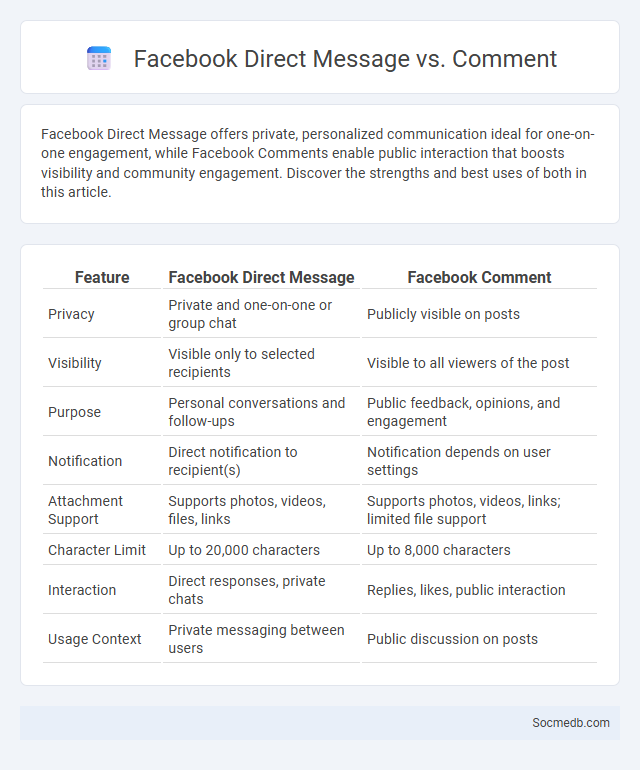
Photo illustration: Facebook Direct Message vs Comment
Facebook Direct Message offers private, personalized communication ideal for one-on-one engagement, while Facebook Comments enable public interaction that boosts visibility and community engagement. Discover the strengths and best uses of both in this article.
Table of Comparison
| Feature | Facebook Direct Message | Facebook Comment |
|---|---|---|
| Privacy | Private and one-on-one or group chat | Publicly visible on posts |
| Visibility | Visible only to selected recipients | Visible to all viewers of the post |
| Purpose | Personal conversations and follow-ups | Public feedback, opinions, and engagement |
| Notification | Direct notification to recipient(s) | Notification depends on user settings |
| Attachment Support | Supports photos, videos, files, links | Supports photos, videos, links; limited file support |
| Character Limit | Up to 20,000 characters | Up to 8,000 characters |
| Interaction | Direct responses, private chats | Replies, likes, public interaction |
| Usage Context | Private messaging between users | Public discussion on posts |
Introduction to Facebook Communication Channels
Facebook communication channels offer versatile platforms for direct interaction, including Messenger, Pages, Groups, and Stories. These channels enable businesses and individuals to engage audiences through real-time messaging, targeted content sharing, and community building. Understanding how to leverage your presence across these tools can significantly enhance your social media strategy and audience reach.
What is a Facebook Direct Message?
A Facebook Direct Message (DM) is a private communication feature within Facebook Messenger that allows users to send text, images, videos, and voice messages directly to one or multiple recipients. This messaging tool offers real-time conversations while maintaining privacy, distinct from public posts or comments on the Facebook platform. Facebook Direct Messages support multimedia sharing, read receipts, and even end-to-end encryption for secure communication.
Understanding Facebook Comments
Facebook comments provide valuable insights into user engagement, reflecting opinions, emotions, and community interactions on posts. Analyzing comment patterns, sentiment, and frequency reveals audience preferences and brand perception, enhancing targeted marketing strategies. Effective interpretation of Facebook comments requires considering context, tone, and reply dynamics to foster meaningful online communication.
Private Messaging: Features and Benefits
Private messaging on social media platforms offers secure, real-time communication that enhances your privacy and control over shared content. Features like end-to-end encryption, customizable chat settings, and multimedia support ensure your conversations remain confidential and engaging. Utilizing these tools strengthens personal connections while protecting sensitive information from public exposure.
Public Interaction: Features of Comments
Comments on social media platforms enable direct public interaction by allowing users to share feedback, opinions, and engage in real-time conversations. These features often include threaded replies, like or dislike options, and moderation tools to maintain constructive dialogue. Your engagement in comment sections enhances visibility and fosters community building around shared interests.
Privacy Considerations in Messaging vs Commenting
Privacy considerations in messaging prioritize end-to-end encryption, ensuring that conversations remain confidential between participants, unlike commenting which is typically public or visible to a broader audience. Private messaging platforms often incorporate features like disappearing messages and user authentication to enhance security. Commenting exposes user content to potentially unlimited viewers, increasing risks of data tracking and profile building by third parties.
Engagement and Reach: DM vs Comment
Direct Messages (DMs) create personalized interactions that deepen audience engagement through one-on-one conversations, fostering trust and loyalty. Comments, however, expand your social media reach by sparking public discussions that attract broader visibility and increase organic impressions. Your strategy should balance DMs for intimate connections and comments for amplifying brand presence.
Best Use Cases for Facebook Direct Messages
Facebook Direct Messages excel in personalized customer support by enabling swift, private communication that enhances user satisfaction. Businesses leverage these messages for targeted promotions and exclusive offers, driving higher engagement and conversions. You can build stronger client relationships through real-time interaction and tailored content delivery via this platform.
Best Use Cases for Facebook Comments
Facebook comments excel in fostering direct interaction between brands and customers, enhancing engagement through real-time feedback and personalized responses. Your ability to monitor and respond to comments quickly can boost customer trust and drive higher conversion rates. Leveraging Facebook comments as a platform for community building and product insights offers valuable opportunities for market research and improved customer satisfaction.
Choosing the Right Channel for Your Communication Needs
Selecting the appropriate social media channel hinges on understanding your target audience's demographics and engagement preferences. Platforms like Instagram and TikTok excel in visual storytelling for younger users, while LinkedIn caters to professional networking and B2B communication. You should align your content type and communication goals with the social media channel that maximizes reach and interaction for your specific needs.
 socmedb.com
socmedb.com